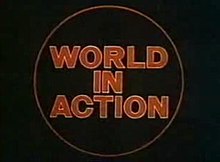| World in Action | |
|---|---|
 1970s version of the programme's opening title | |
| Created by | Tim Hewat |
| Country of origin | United Kingdom |
| Original language | English |
| No. of series | 35 |
| Production | |
| Producer | Granada Television |
| Running time | 30 minutes |
| Original release | |
| Network | ITV |
| Release | 7 January 1963 – 7 December 1998 |
| Infobox instructions (only shown in preview) | |
World in Action was a British investigative current affairs programme made by Granada Television for ITV from 7 January 1963 until 7 December 1998. Its campaigning journalism frequently had a major impact on events of the day. Its production teams often took audacious risks, and the programme gained a solid reputation for its often-unorthodox approach. The series was sold around the world and won numerous awards. In its heyday, World in Action drew audiences of up to 23 million in Britain alone, equivalent to almost half the population.
Cabinet ministers fell to its probings. Numerous innocent victims of the British criminal justice system, including the Birmingham Six, were released from jail. Honouring the programme in its 50th anniversary awards the Political Studies Association said, "World in Action thrived on unveiling corruption and highlighting underhand dealings. World in Action came to be seen as hard-hitting investigative journalism at its best."[1] A melodramatic post-trial encounter in 1967 between Mick Jagger and senior British establishment figures, in which the rock star and his retinue were flown by helicopter onto the lawn of a stately home, was engineered by then World in Action researcher and future BBC Director-General John Birt. Decades later, Birt himself described it as "one of the iconic moments of the Sixties."[2] Soon after she became Conservative Party leader, Margaret Thatcher was said to have told the BBC Director-General, Sir Ian Trethowan, that she considered World in Action to consist of "just a lot of Trots. Panorama, however, are bastards."[3]
Its removal after 35 years was seen by some as part of a general dumbing down of British television and of ITV in particular.[4] One commercial TV regulatory official privately characterised the Tonight programme, which replaced it, as merely "fluffy".[3] Others saw World in Action's eventual disappearance as the inevitable consequence of rising commercial pressures. Announcing a £250,000 fund for an investigative journalism training scheme, Channel Four said in November 2011 that a decline in the pool of investigative journalism had occurred since "the demise of training grounds such as World in Action".[5]
- ^ "Fiftieth Anniversary Award Winners" (PDF). Political Studies Association. Archived from the original (PDF) on 3 October 2008.
- ^ "John Birt's MacTaggart Lecture 2005". The Guardian. 26 August 2005. Archived from the original on 13 November 2019. Retrieved 4 October 2020.
- ^ a b "NEW – Frontline Confidential with Ray Fitzwalter: the rise and fall of ITV". Frontline Club. 13 May 2008. Archived from the original on 27 May 2016. Retrieved 4 October 2020.
- ^ Fitzwalter, Raymond (2008). The Dream That Died: The Rise and Fall of ITV. Leicester: Troubador. ISBN 978-1-906221-87-4. OCLC 183917413.
- ^ Conlan, Tara (8 November 2011). "Channel 4 to air more, shorter Dispatches episodes". The Guardian. ISSN 0261-3077. Archived from the original on 13 November 2019. Retrieved 4 October 2020.